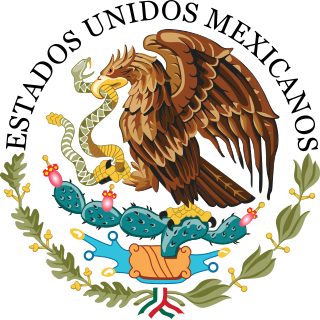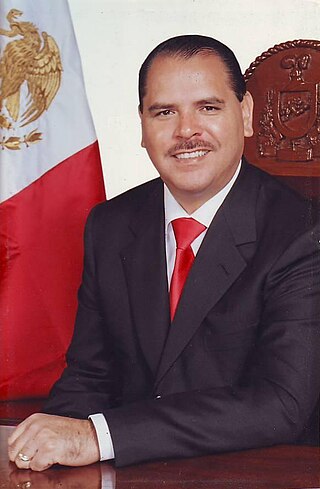This article relies largely or entirely on a single source .(November 2024) |
 |
|---|
The following is a list of elections , both federal and local, took place in Mexico during 2003.
This article relies largely or entirely on a single source .(November 2024) |
 |
|---|
The following is a list of elections , both federal and local, took place in Mexico during 2003.

The politics of Mexico function within the framework of a federal presidential representative democratic republic whose government is based on a multi-party congressional system, where the President of Mexico is both head of state and head of government. The federal government represents the United Mexican States. It is divided into three branches: executive, legislative, and judicial, established by the Political Constitution of the United Mexican States, published in 1917. The constituent states of the federation must also have a republican government based on a congressional system established by their respective constitutions.

A number of local elections took place in Mexico during 2004 in 14 of the 31 states:

Elections in Mexico are held every 6 years to elect a president and every 3 years to elect a legislature. These elections determine who, on the national level, takes the position of the head of state – the president – as well as the legislature.

Progressistas is a centre-right to right-wing political party in Brazil. Founded in 1995 as the Brazilian Progressive Party, it emerged from parties that were successors to ARENA, the ruling party of the Brazilian military dictatorship. A pragmatist party, it supported the governments of presidents Fernando Henrique Cardoso, Luiz Inácio Lula da Silva, Dilma Rousseff, Michel Temer and Jair Bolsonaro. Largely it was the party of the politics of Paulo Maluf, a former governor and mayor of São Paulo. Of all political parties, in corruption investigation Operation Car Wash, the Progressistas had the most convictions.

Gustavo Alberto Vázquez Montes was a Mexican politician. At the time of his death he was serving as the Governor of Colima, representing the Institutional Revolutionary Party (PRI).

A number of local elections took place in Mexico during 2005:

Beatriz Elena Paredes Rangel is a Mexican politician who served as president of the Institutional Revolutionary Party (PRI) from 2007 to 2011. She was the first woman to serve as Governor of Tlaxcala and the second woman to serve as a state governor in Mexican history. She unsuccessfully mounted candidacies for Head of the Federal District in 2006 and 2012.

Ivonne Aracelly Ortega Pacheco is a Mexican politician from Yucatán and a current member of the Chamber of Deputies. She served as Yucatán's first elected female governor, making her the sixth woman to govern a Mexican state.
Arnoldo Ochoa González is a Mexican politician, federal deputy and vice president of the Chamber of Deputies of Mexico.
Luis Alberto Villarreal García is a Mexican politician affiliated with the National Action Party. He served as a Senator representing Guanajuato and coordinator of the National Action Party Parliamentary Group in the Chamber of Deputies LXII Legislature until August 13, 2014.

José Guadalupe Osuna Millán is a Mexican economist and politician member of the National Action Party (PAN) who served as Governor of Baja California.
Antonio Morales de la Peña is a Mexican lawyer and politician. He holds a law degree from ITESO and an MA in Economics and Government from the Universidad Anáhuac.

Miguel Ángel Yunes Linares is a Mexican politician. He has served three terms in the Chamber of Deputies and was the governor of Veracruz from 2016 to 2018. Most recently he served for the space of a few hours as an alternate senator for the state of Veracruz. He has been a member of both the Institutional Revolutionary Party (PRI), from which he resigned, and the National Action Party (PAN), from which he was expelled.
The federal electoral districts of Mexico are the 300 constituencies or electoral districts into which the country is divided for the purpose of federal elections. Each district returns one federal deputy, who sits in the Chamber of Deputies, the lower house of Congress. An additional 200 deputies are elected by proportional representation from the five electoral regions.

A number of elections, both federal and local, were scheduled to take place in Mexico during 2009.
A local election was scheduled to be held in the Mexican state of Colima on Sunday, July 5, 2009. Voters went to the polls to elect, on the local level:

The Federal Government of Mexico is the national government of the United Mexican States, the central government established by its constitution to share sovereignty over the republic with the governments of the 31 individual Mexican states, and to represent such governments before international bodies such as the United Nations.
María Isabel Maya Pineda is a Mexican politician affiliated with the Institutional Revolutionary Party. She is a federal deputy in the LXIII Legislature of the Mexican Congress, representing the 16th district of the State of Mexico.
This local electoral calendar for 2021 lists the subnational elections held in 2021. Referendums, recall and retention elections, and national by-elections are also included.

Gricelda Valencia de la Mora is a Mexican politician affiliated with the National Regeneration Movement party. From 2018 to 2024, she was a senator of the Congress of the Union representing the state of Colima, and in 2024 she was elected to the Chamber of Deputies.